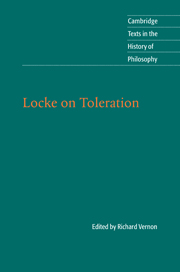Book contents
- Frontmatter
- Contents
- Acknowledgements
- Introduction
- Chronology
- Further reading
- Note on the texts and translation
- Locke on Toleration
- Locke: A Letter concerning Toleration
- Locke: From the Second Treatise (in Two Treatises of Government, 2nd edn, 1698)
- Locke: From An Essay concerning Human Understanding (4th edn, 1700)
- Proast: The Argument of the Letter concerning Toleration, Briefly Considered and Answered (1690)
- Locke: From A Second Letter concerning Toleration (1690)
- Proast: From A Third Letter concerning Toleration in Defence of the Argument of the Letter concerning Toleration, Briefly Considered and Answered (1691)
- Locke: From A Third Letter for Toleration (1692)
- Proast: From A Second Letter to the Author of the Three Letters for Toleration (1704)
- Locke: From A Fourth Letter for Toleration (1704)
- Index
- Titles in the series
Locke: From the Second Treatise (in Two Treatises of Government, 2nd edn, 1698)
Published online by Cambridge University Press: 05 June 2012
- Frontmatter
- Contents
- Acknowledgements
- Introduction
- Chronology
- Further reading
- Note on the texts and translation
- Locke on Toleration
- Locke: A Letter concerning Toleration
- Locke: From the Second Treatise (in Two Treatises of Government, 2nd edn, 1698)
- Locke: From An Essay concerning Human Understanding (4th edn, 1700)
- Proast: The Argument of the Letter concerning Toleration, Briefly Considered and Answered (1690)
- Locke: From A Second Letter concerning Toleration (1690)
- Proast: From A Third Letter concerning Toleration in Defence of the Argument of the Letter concerning Toleration, Briefly Considered and Answered (1691)
- Locke: From A Third Letter for Toleration (1692)
- Proast: From A Second Letter to the Author of the Three Letters for Toleration (1704)
- Locke: From A Fourth Letter for Toleration (1704)
- Index
- Titles in the series
Summary
Chapter xi: Of the extent of the legislative power
§134. The great end of men's entering into society being the enjoyment of their properties in peace and safety, and the great instrument and means of that being the laws established in that society, the first and fundamental positive law of all commonwealths is the establishing of the legislative power, as the first and fundamental natural law which is to govern even the legislative itself is the preservation of the society and (as far as will consist with the public good) of every person in it. This legislative is not only the supreme power of the commonwealth, but sacred and unalterable in the hands where the community have once placed it; nor can any edict of anybody else, in what form soever conceived, or by what power soever backed, have the force and obligation of a law which has not its sanction from that legislative which the public has chosen and appointed; for without this the law could not have that which is absolutely necessary to its being a law, the consent of the society, over whom nobody can have a power to make laws but by their own consent and by authority received from them; and therefore all the obedience, which by the most solemn ties anyone can be obliged to pay, ultimately terminates in this supreme power, and is directed by those laws which it enacts.
- Type
- Chapter
- Information
- Locke on Toleration , pp. 47 - 49Publisher: Cambridge University PressPrint publication year: 2010



